
Related
Guests
- Ghassan Abu-SittahBritish Palestinian reconstructive surgeon who volunteered in Gaza for over a month, treating patients at Al-Shifa and Al-Ahli hospitals.
- Feroze Sidhwatrauma surgeon volunteering at the European Hospital in Khan Younis.
Israeli forces withdrew from Al-Shifa Hospital in Gaza City today after a two-week raid that has left most of the medical complex in ruins. Since October, Gaza’s health sector has been completely decimated, leaving only a dozen hospitals partially functional as the entire medical infrastructure is relentlessly shelled, besieged and raided. We speak to British Palestinian reconstructive surgeon Ghassan Abu-Sittah, who spent over a month treating patients at Al-Shifa and Al-Ahli Baptist hospitals. He pays tribute to Dr. Ahmad Maqadmeh, a fellow surgeon who was found killed today alongside his mother at Al-Shifa. “I blame the Western journalists, who perpetuated the narrative that militarized the hospital as a justifiable and acceptable target,” says Abu-Sittah about Maqadmeh’s death. “This was a war Israel declared on Palestinian children,” he later concludes, “because Palestinian children represent the Palestinian tomorrow that is incompatible with the Zionist settler-colonial project.” Plus, we hear from a trauma surgeon currently volunteering at the European Hospital in Khan Younis. Dr. Feroze Sidhwa describes the scene at the hospital as a squalid shelter for thousands of refugees. “There’s no privacy, no dignity for any of these people,” he says.
Transcript
AMY GOODMAN: Israeli forces withdrew from Gaza’s largest hospital, Al-Shifa, today after a two-week raid that’s left most of the medical complex in ruins, with dead bodies on the ground and a wasteland of charred and destroyed buildings. The government media office in Gaza said over 400 Palestinians were killed and over 1,000 homes in the area of Al-Shifa destroyed. Army bulldozers also plowed over a makeshift cemetery in the hospital courtyard. The World Health Organization said at least 21 patients died since the raid began March 18th.
Built in 1946, Shifa was once the flagship medical facility in Gaza. Since October, Gaza’s health sector has been completely decimated. Only two hospitals are minimally functional and 10 partially functional, according to the United Nations. The rest have shut down completely after being shelled, besieged and raided by Israeli troops, or running out of fuel and medicine.
On Sunday, an Israeli airstrike hit a tent encampment outside of Al-Aqsa Martyrs Hospital in Deir al-Balah. The attack killed two Palestinians and injured seven journalists.
The death toll in Gaza is nearly 33,000, including 14,000 children. Many thousands of others are missing under the rubble and presumed dead. The number of wounded has topped 75,000.
For more, we’re joined by Dr. Ghassan Abu-Sittah, a British Palestinian reconstructive surgeon. He worked in Gaza for over a month as a volunteer with Doctors Without Borders treating patients at both Al-Shifa and Al-Ahli Baptist hospitals. He’s joining us from London.
Welcome to Democracy Now! It’s great to have you with us. So, you have heard the news, Dr. Abu-Sittah, Al-Shifa destroyed, the largest medical complex in the Gaza Strip. Can you talk about its significance and then talk about your experiences when you were in Gaza?
DR. GHASSAN ABU-SITTAH: First of all, if you’ll allow me, Amy, I’d like to start by paying tribute to my friend and colleague, Dr. Ahmad Maqadmeh, a young, brilliant plastic surgeon with whom I had worked at Shifa during this war and at Al-Ahli Hospital. And I had worked with him before during the '21 war and during the Marches of Return. His body, alongside that of his mother, were found today when the Israeli troops withdrew, and they had been executed by the Israeli army while trying to escape Shifa. Dr. Ahmad was a brilliant and dedicated young surgeon who had won the humanitarian fellowship of the Royal College of Surgeons of England. And it's critical that we remember their names and we remember their stories. And today I want to send my love to his wife and to his children, both under the age of 5, who are now left without a husband and a father. Along with so many of my colleagues who we’ve lost, this is the second plastic surgeon who I had worked with at Shifa who has been killed by the Israelis, and over 345 doctors and nurses and paramedics who have been killed by the Israelis, intentionally targeted.
Now, with regards to Shifa, Shifa was 30% of the capacity of the health system in Gaza. And so, the destruction of Shifa, the wanton destruction of Shifa, is a critical component of Israel’s plan to genocidally make sure that Gaza becomes an uninhabitable place even after a ceasefire happens. By destroying Shifa and making sure that it is irreparable, the Israelis are trying to make sure that, for years to come, Gaza does not have a functioning health system. Shifa now needs to be completely demolished, and a new building and a new hospital built, which means you’re looking at three to five years once the building starts. This is part of the genocidal machine.
But for me, as someone who has — you know, I went, I reached Shifa Hospital on the 10th of October, on the morning of the Tuesday, and was in Shifa on and off throughout my whole 43 days in Gaza. It is not just the Israeli soldiers and the Israeli leaders, the genocidal tip of the iceberg, that I blame. I blame the Western journalists, who perpetuated the narrative that militarized the hospital as a justifiable and an acceptable target to the Israelis. These genocide enablers, these Western journalists, from the very beginning, peddled these stories that the Israelis were feeding them about Shifa being on top of this massive complex of a command-and-control center. And their job was to enable the genocide to take place. And the genocide can only take place if the health system is destroyed. And so, they have the blood of my friend — the blood of Ahmad Maqadmeh is on the hands of the CNN journalists and the BBC journalists and the ITV journalists, who, from the very beginning, were peddling this narrative.
AMY GOODMAN: I’m looking at a comment right now from Raed al-Nims, a representative for the Palestinian Red Crescent Society, who said many departments at Al-Shifa Hospital were “set on fire.” “Many bodies” are lying around the ground. Al-Nims told Al Jazeera, “The situation is dire, the medical staff, some of them were killed, others tortured, others detained, and above all, they have been besieged for two weeks without any medical supplies or even food or water.” “Shifa” itself means “healing.” It’s a house of healing. Also, a thousand houses in the area were also destroyed as the Israeli military destroyed the hospital. Dr. Ghassan Abu-Sittah, as you worked there, can you talk about, especially since you are a reconstructive surgeon, the child amputees and what they face, in there and the other hospitals you worked in?
DR. GHASSAN ABU-SITTAH: So, from the very beginning, it was obvious that half of the wounded were children. And, you know, on a daily basis, my operating list would be between eight and 12 surgeries, and half of them were children. And the sheer ferocity of the bombing, the fact that the Israelis were targeting people’s homes, meant that a lot of these children, either their limbs were blown right off at the explosion or were crushed beyond repair as a result of the debris and the collapsing buildings that they were taken from underneath. As the war progressed, as the health system became so overwhelmed, previously reconstructable limbs became unrestrictable and required amputation to save the patients’ lives from gangrene and infection.
And so, what we have is a process by which these children — and my estimate is that they are now probably around 4,000 to 5,000 — these children are now left with disabilities that will change the course of their lives. We know from the medical literature that each child with a lower limb prosthetic will need a new prosthetic every six months, because their body outgrows the length of the prosthesis, and will need between eight and 12 surgeries by the time they’re of adult age, because the bone grows faster than the soft tissues, or the nerves attach themselves to the skin and they can’t wear the prosthesis. And so, this is a lifelong trajectory of surgery and of disability and of mental health scarring as a result of the deformity.
Take into account, in addition to that, that a lot of these children are orphaned. You know, there are 17,000 children in Gaza who have lost their parents, and many of these are wounded children. And so, to go through all of this with no family to look after you is just — the legacy will be the legacy of this war. And this is a war — from the very beginning, this was a war Israel declared on Palestinian children. You know, Israel wants to wipe out Palestinian children, because Palestinian children represent the Palestinian tomorrow that is incompatible with the Zionist settler-colonial project. Zionists cannot envision a Palestinian tomorrow and were targeting Palestinian children.
AMY GOODMAN: I wanted to quote from The New Yorker, that quotes you extensively, Doctor, as you talk about this is the biggest cohort of pediatric amputees in history. Eliza Griswold writes, “To mark the gravity of these procedures, and to mourn, Abu-Sittah and other medical staff placed the severed limbs of children in small cardboard boxes. They labelled the boxes with masking tape, on which they wrote a name and body part, and buried them.” Talk more about what you did.
DR. GHASSAN ABU-SITTAH: There was one night when I was in Ahli Hospital when the Israelis had targeted a mosque which had been used by the internally displaced, where, by 5:00 that morning, I had performed amputations on six children. And such is the aim, to dehumanize these children, the aim of the settler-colonialist genocidal war, to dehumanize these children, that my colleagues and I wanted to maintain their dignity and wanted to not just bear witness but to hold on to anything that makes us and them human in the face of this dehumanizing war machine. And so we insisted that whenever there was a limb that was amputated, that it gets the right burial and that this child’s name is on that amputated limb and that we maintain the dignity of our patient to the extent that we can.
AMY GOODMAN: Doctor, The Washington Post is reporting the Biden administration just authorized the transfer of billions of dollars in bombs and fighter jets to Israel, the arms package including more than 1,800 MK-84 2,000-pound bombs, which can be used to level entire city blocks, U.S. also sending 500 MK-82 500-pound bombs and 25 F-35 fighter jets. I’m wondering if you can comment on this, especially in light of recently being elected rector of the University of Glasgow, your alma mater. It was a position once held by Winnie Mandela. You won by a wide majority, running on a pro-Palestinian solidarity platform and urging divestment from the arms trade. Can you talk about this?
DR. GHASSAN ABU-SITTAH: So, one of the things you do realize when you leave this death world in Gaza and you come out to the outside world is that you come to realize that Israel is just the tip of genocidal iceberg, that the United States, the United Kingdom, France, Italy, all of these NATO countries represent the remainder of the genocidal project. And these countries are not just supporting Israel. They are supporting Israel’s genocidal project, because, as the Colombian president said, they want to send the message to any other troublesome Native who considers changing the rules of the global game by rebelling.
And so, when we talk about the genocide, we should not just talk about the Israelis as the perpetrators of the genocide. We should talk about the “Axis of Genocide,” these countries, these governments that are perpetuating this genocide. And we know just not just this article. There’s also been another article showing how much intelligence information has been passed on to the Israelis that ensured the Israelis are able to carry out these massacres. And so, when we talk about the genocide, it’s an American, British, French, European genocide against the Palestinian people, of which Israel is the spearhead but not just the sole perpetrator.
AMY GOODMAN: Finally, there were perhaps as many as 200,000 people protesting in London alone this weekend. That’s where you’re speaking from, Dr. Ghassan Abu-Sittah. Talk about the significance of this and if this is making a difference. Wasn’t there also a letter from something like 150 British MPs who wrote a letter demanding stopping the arming of Israel?
DR. GHASSAN ABU-SITTAH: Since the International Court of Justice produced its interim ruling that this is plausibly a genocidal war — and I think there’s no one that has any doubt about it — the British government is now legally complicit in the act of genocide. The universities that hold shares in BAE Systems, the arms manufacturer that has continued to supply weapons to Israel, are also complicit. And this is one of the things that we ran on as part of the campaign for rector of Glasgow University. If you own shares in an arms company that has sent parts or complete weapons to the Israelis in this genocidal war, you are complicit, under international law, in genocide.
All of this highlights the fact that this is a genocidal project that extends from Tel Aviv to London to Washington to Paris to Rome — to all of these countries. These are genocidal partners, complicit in an attempt to wipe out the Palestinian people. The 200,000, hundreds of thousands of people who are coming out every weekend, be it in Europe or North America, are basically saying, “Not in our name.” They will not be complicit in the acts of genocide that their governments are perpetrating. These people want to absolve themselves from what their governments are doing, by refusing to be part of a genocidal war in the 21st century.
AMY GOODMAN: I want to end with Dr. Feroze Sidhwa, a trauma surgeon who’s currently volunteering at European Hospital in Khan Younis, in Gaza right now. We’ve been trying to reach him nonstop for the show today, but in case we couldn’t, which we can’t — he can almost never do live communication; it just doesn’t work — he sent us this voice message. He’s working with the Palestinian American Medical Association in collaboration with the World Health Organization. On Sunday, Dr. Sidhwa sent this update as he walked from his living quarters to the European Hospital.
DR. FEROZE SIDHWA: The hospital itself is basically a displaced persons camp. I just walked out of my — I live in a little building called the Midan at the end of the square. It’s a kind of an outlying area of the hospital. And yeah, just walking, walking into the hospital. It’s only about a five-minute walk. It’s just squalor everywhere, the kids running around without shoes, kids running around with sores, people actually wheeling their family members around in a hospital bed sometimes, a bunch of cars that can’t move anywhere because there’s no gasoline. They’re using them as beds and shelters sometimes. But, you know, you can see there’s no privacy, no dignity for any of these people.
But they somehow maintain their humanity. It’s pretty impressive to see, actually. I’m walking by the four latrines that people share here. I’m told there’s 20,000 people on the hospital grounds, and they share four latrines. It’s ridiculous. You can imagine the smell. And it’s literally right in front of the hospital main entrance, which is also a giant tent city. But yeah, no, you know, the way these people attempt to maintain some of their own dignity and humanity, you know, they’re maintaining their custom of Ramadan. They’re still staying in family units despite the fact that they have been displaced multiple times each. A lot of them, this is their — you know, leaving aside the 1948 or 1967 displacements, some of them have been displaced three or four times just from this war. Half of the medical students, their families are dead. They were displaced.
CHILD: Hello!
DR. FEROZE SIDHWA: Hello. Half of them were displaced from — the kids love to say hello to anybody that they’ve figured out is a foreigner. And, you know, half the medical students, their families — they have family members who died. And still, you know, they’re not even in medical school down here, but they go, they come down here, and they just came to Gaza European Hospital to volunteer. And they actually run the emergency room, for the most part, right now.
AMY GOODMAN: That was Dr. Feroze Sidhwa at European Hospital in Khan Younis Sunday. Final words to Dr. Ghassan Abu-Sittah, who is recently out of Gaza, British Palestinian reconstructive surgeon. Your final thoughts?
DR. GHASSAN ABU-SITTAH: You know, today, as we grieve for our friend, one tries to maintain a level of hope. And so we end with the words of the immortal Bobby Sands: We will defeat them with the laughter of our children.
AMY GOODMAN: Dr. Ghassan Abu-Sittah, I want to thank you so much for being with us, British Palestinian reconstructive surgeon, worked in Gaza for over a month as a volunteer with Doctors Without Borders, treating patients at both Al-Shifa, which has now been almost totally destroyed, and Al-Ahli Baptist hospitals.
When we come back, Palestinian Christians faced severe restrictions this weekend on entering the Old City in Jerusalem to mark Easter Sunday. We’ll go to Bethlehem to speak with Dr. Munther Isaac, pastor of the Evangelical Lutheran Christmas Church in Bethlehem, famous for the crèche he made at Christmas, “Christ in the Rubble.” Stay with us.

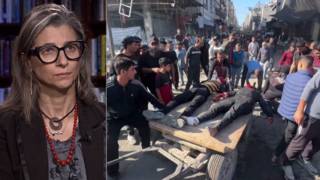
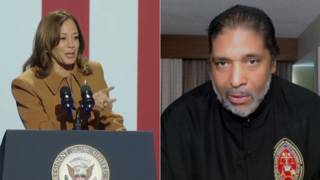

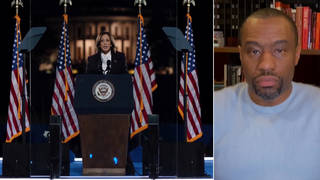



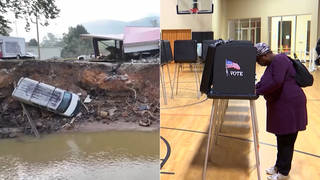

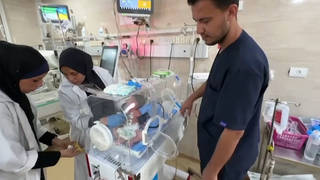


Media Options